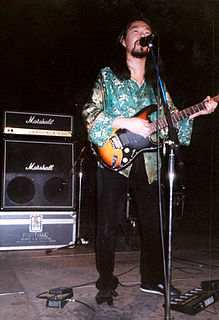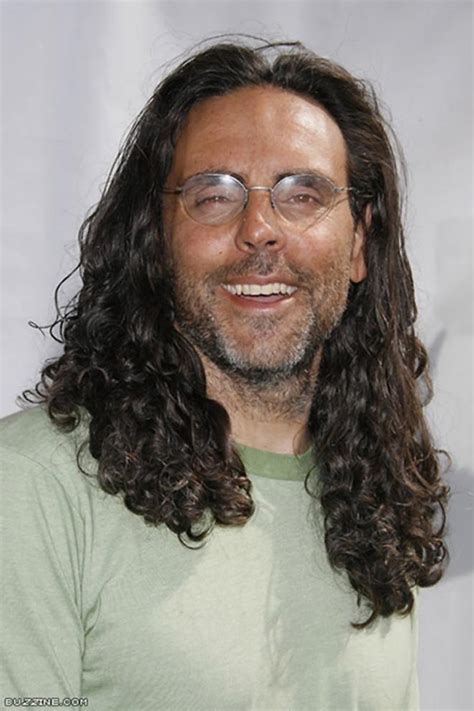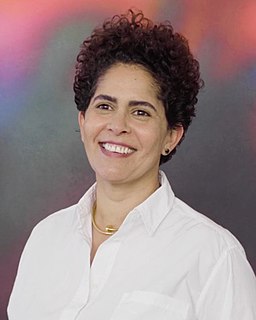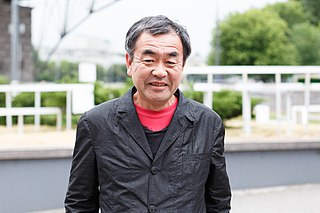A Quote by Terence McKenna
And yet my, not only my faith, but my experience has led me to believe that the world is not a construction of space and time and matter and energy. That that mapping is insufficient. That the world is instead some kind of a linguistic construct. It is more in the nature of a sentence, or a novel, or a work of art than it is in the nature of these machine models of interlocking law that we inherit out of a thousand years of rational reductionism.
Quote Topics
Related Quotes
Apparently there is a great discovery or insight which our culture is deliberately designed to suppress, distort, and ignore. That is that nature is some kind of minded entity. That nature is not simply the random flight of atoms through electromagnetic fields. Nature is not the empty, despiritualized , lumpen matter that we inherit from modern physics. But it is instead a kind of intelligence, a kind of mind.
In the new alchemy, we have a similar kind of way of thinking. Our internal space includes our intuitions, our thoughts, our senses and our feelings, and from these we construct or build a picture of the outside world. From intuition and thought, we construct time. We also construct space from thought and our sensations. From our senses and our feelings, we experience energy, and from our intuitions and our feelings, we experience motion.
We are too much in the machine world today. Even here in Tuva we've got every year more and more cars and other technologies, and of course it brings more pollution to our air, to nature. And I think the idea of the Kraftwerk song is people should not be very much mechanized or to be a machine in the world of machines. The idea is to try to find a golden middle between the world of nature and the world of machines.
Language is inherently not concerned with logic. As an expression of the psychological activities of humankind, it simply follows a linear process as it seeks actualisation. Moreover, it does not obey the objective concepts of time and space that belong to the physical world. When the discussion of time and space is imported into linguistic art from scientific aims and research methods, that linguistic art is entirely reduced to trifling pseudo-philosophical issues.
Mars is the next frontier, what the Wild West was, what America was 500 years ago. It's time to strike out anew....Mars is where the action is for the next thousand years....The characteristic of human nature, and perhaps our simian branch of the family, is curiosity and exploration. When we stop doing that, we won't be humans anymore. I've seen far more in my lifetime than I ever dreamed. Many of our problems on Earth can only be solved by space technology....The next step is in space. It's inevitable.
Nature is very clear on this. In fact, there's one fundamental law that all of nature obeys that mankind breaks everyday. Now this is a law that's evolved over billions of years and the law is this: nothing in nature takes more than it needs. A redwood tree doesn't take all of the soil's nutrients, just what it needs to grow. A lion doesn't kill every gazelle, just one. We have a term for something in the body when it takes more than its share. We call it cancer.
You could say that my aim is ‘to recover the place’. The place is a result of nature and time; this is the most important aspect. I think my architecture is some kind of frame of nature. With it, we can experience nature more deeply and more intimately. Transparency is a characteristic of Japanese architecture; I try to use light and natural materials to get a new kind of transparency.
He didn't believe in a God who sifted through prayers, answering some and ignoring others, no matter how unworthy or worthy a person might be. Instead, he preferred to believe in a God who bestowed all people with gifts and abilities and placed them in an imperfect world; only then was faith tested, only then could faith be earned.
If someone does learn about the world from reading a novel of mine, that makes me very happy. It's probably not what brings me into the novel in the first place - I usually am pulled in by some big question about the world and human nature that I'm not going to resolve in the course of the novel. But I'm very devoted to getting my facts straight.
We look at the human body as a biochemical machine controlled by genes and therefore we see a mechanical aspect to life and then try to understand the nature of mechanics by looking at how the physical parts interact with each other. If you want to understand life you just look at it as a whole series of interactive chemical reactions. What we are leaving out is the invisible elements, the contributions of the invisible world, which are emphasized in the nature of quantum mechanics. Matter is energy and is a primary factor that must be considered because everything is ultimately energy.
I am so in favor of the actual infinite that instead of admitting that Nature abhors it, as is commonly said, I hold that Nature makes frequent use of it everywhere, in order to show more effectively the perfections of its Author. Thus I believe that there is no part of matter which is not - I do not say divisible - but actually divisible; and consequently the least particle ought to be considered as a world full of an infinity of different creatures.
Nature consists of facts and of regularities, and is in itself neither moral nor immoral. It is we who impose our standards upon nature, and who in this way introduce morals into the natural world, in spite the fact that we are part of this world. We are products of nature, but nature has made us together with our power of altering the world, of foreseeing and of planning for the future, and of making far-reaching decisions for which we are morally responsible. Yet, responsibility, decisions, enter the world of nature only with us



































